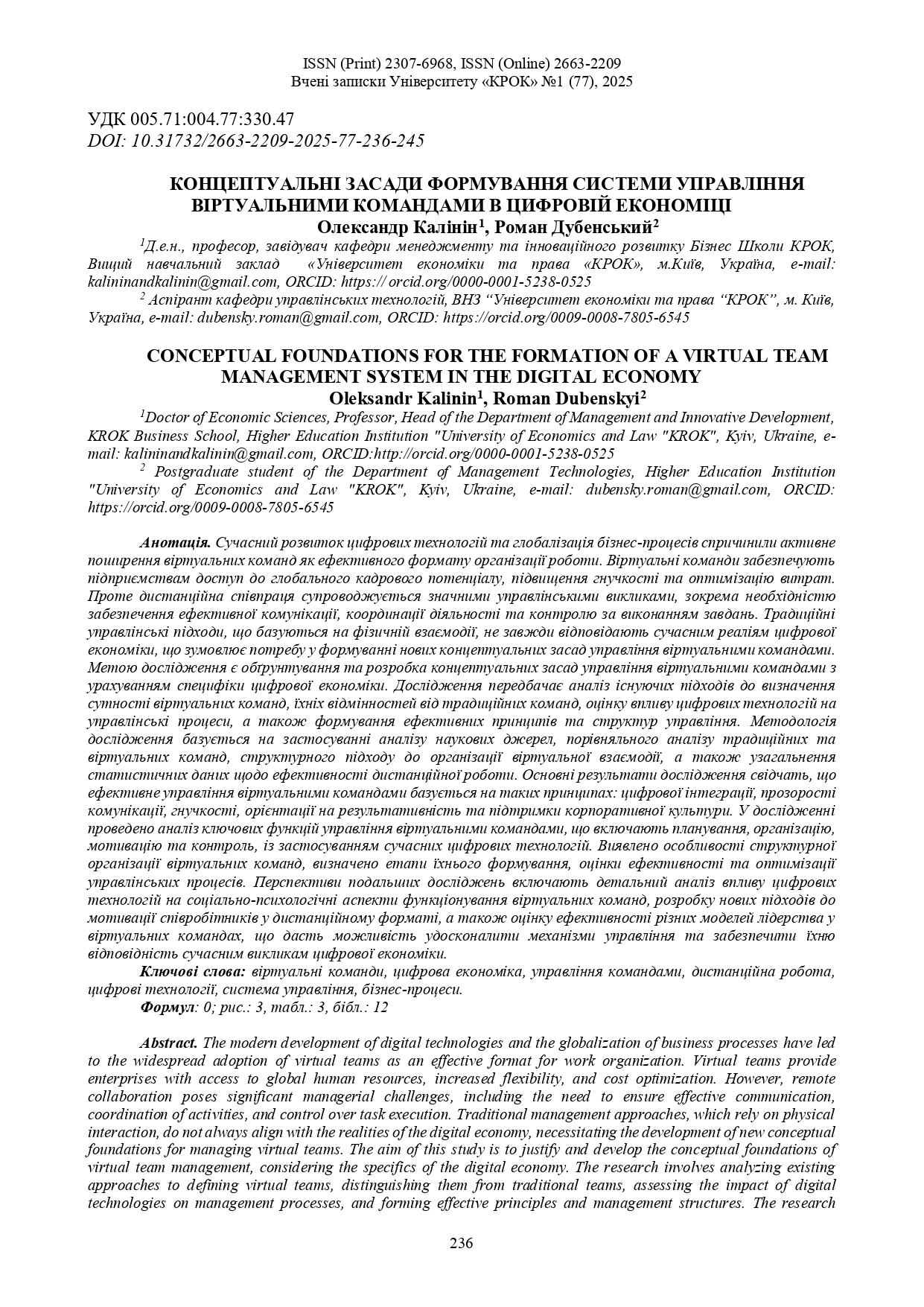CONCEPTUAL FOUNDATIONS FOR THE FORMATION OF A VIRTUAL TEAM MANAGEMENT SYSTEM IN THE DIGITAL ECONOMY
DOI:
https://doi.org/10.31732/2663-2209-2025-77-236-245Keywords:
virtual teams, digital economy, team management, remote work, digital technologies, management system, business processesAbstract
The modern development of digital technologies and the globalization of business processes have led to the widespread adoption of virtual teams as an effective format for work organization. Virtual teams provide enterprises with access to global human resources, increased flexibility, and cost optimization. However, remote collaboration poses significant managerial challenges, including the need to ensure effective communication, coordination of activities, and control over task execution. Traditional management approaches, which rely on physical interaction, do not always align with the realities of the digital economy, necessitating the development of new conceptual foundations for managing virtual teams. The aim of this study is to justify and develop the conceptual foundations of virtual team management, considering the specifics of the digital economy. The research involves analyzing existing approaches to defining virtual teams, distinguishing them from traditional teams, assessing the impact of digital technologies on management processes, and forming effective principles and management structures. The research methodology is based on the analysis of scientific literature, a comparative analysis of traditional and virtual teams, a structural approach to organizing virtual collaboration, and the generalization of statistical data on the effectiveness of remote work. The main research findings indicate that effective virtual team management is based on the principles of digital integration, communication transparency, flexibility, result orientation, and corporate culture support. The study analyzes key management functions in virtual teams, including planning, organization, motivation, and control, with the application of modern digital technologies. The structural organization of virtual teams has been examined, and the stages of their formation, performance evaluation, and management process optimization have been identified. Future research perspectives include a detailed analysis of the impact of digital technologies on the socio-psychological aspects of virtual team operations, the development of new approaches to motivating employees in a remote format, and an assessment of the effectiveness of different leadership models in virtual teams. These efforts will enhance management mechanisms and ensure their alignment with the contemporary challenges of the digital economy.
Downloads
References
Варіс, І., Кравчук, О., & Кир’янова, О. (2023). Напрями оптимізації віртуального командного менеджменту в сучасному бізнес-середовищі. Економіка та суспільство, (48). https://doi.org/10.32782/2524-0072/2023-48-4
Гуменна, О. В., & Синиця, М. А. (2023). Менеджмент віртуальних команд: поведінкові аспекти. Наукові записки НаУКМА. Економічні науки, 8(1), 40–46. https://doi.org/10.18523/2519-4739.2023.8.1.40-46
Кравчук, О. І., Варіс, І. О., & Кир'янова, О. В. (2021). Управління цифровими комунікаціями у віртуальних командах. Improving living standards in a globalized world: opportunities and challenges: Monograph / ред.: T. Nestorenko, T. Pokusa. Ополе, 494–505.
Рудь, Н., & Мохнар, М. (2016). Віртуальні підприємства: сутність та доцільність використання в інноваційній діяльності. Ekonomichnyi forum [Economic Forum], 4, 197–207. http://nbuv.gov.ua/UJRN/ecfor_2016_4_30
Alaiad, A., Alnsour, Y., & Alsharo, M. (2019). Virtual Teams: Thematic Taxonomy, Constructs Model, and Future Research Directions. IEEE Transactions on Dependable and Secure Computing, 62, 211–238.
Beirouty, Z. A., & Demirel, A. G. (2022). Enrichment of Virtual Teams Management through Communication. Asian Journal of Social Science and Management Technology, 4, 15.
Buffer. (2022). State of Remote Work Report 2022. https://buffer.com/state-of-remote-work
Daassi, M., Jawadi, N., Favier, M., & Kalika, M. (2010). Building Collective Awareness in Virtual Teams: The Effect of Leadership Behavioral Style. In M. Al-Qirim (Ed.), Leadership in the Digital Enterprise: Issues and Challenges (p. 23). IGI Global.
da Silva, F. P., Mosquera, P., & Soares, M. E. (2022). Factors influencing knowledge sharing among IT geographically dispersed teams. Technological Forecasting and Social Change, 174, 121299.
Gartner. (2022). What’s New in Digital Government From the 2022 Gartner Hype Cycle. https://www.gartner.com/en/articles/what-s-new-in-digital-government-from-the-2022-gartner-hype-cycle
Owl Labs. (2022). State of Remote Work 2022. https://www.owllabs.com/state-of-remote-work
Kalinin, O., Gonchar, V., Zakharchenko, O., Darushyn, O., Maltsev, M., & Datsiuk, P. (2024). A Comprehensive Methodology for Evaluating Economic Security in the Digitalization of Investment Processes. Revista De Gestão Social E Ambiental, 18(5), e05441. https://doi.org/10.24857/rgsa.v18n5-026

Downloads
Published
How to Cite
Issue
Section
License

This work is licensed under a Creative Commons Attribution-NonCommercial 4.0 International License.

